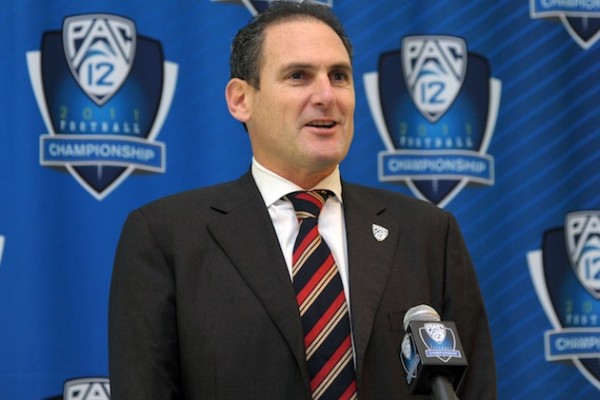Pac-12 Commissioner Larry Scott Makes A Lot Of Money: Are You Surprised?
Posted by Chris Johnson on May 21st, 2013Chris Johnson is an RTC Columnist. He can be reached @ChrisDJohnsonn.
Lavish contracts of conference commissioners and university presidents and whopping cable rights deals lie at the nexus of most any modern-day ethical and moral-based anti-amateurism rant. People see massive salary figures and television revenues, look the other way and see student-athletes making not a dime over what’s guaranteed from one-year, renewable, merit-based grant-in-aid scholarships, and wonder how anyone could ever allow such a system to take root. They get angry, and furiously shout denunciatory things at their computer and television screens (theoretically, anyways). They read updates about the impending Ed O’Bannon lawsuit, and how its sweeping implications have the potential to completely uproot the NCAA’s long-unimpeachable amateurism ruling model. They envision a future where collegiate athletes are granted what their physical talents and revenue-generating abilities rightly deserve – in an Olympic-style model where bylaw 785947.23 doesn’t exist and where the financial stakes aren’t so egregiously stacked against the very athletes who generate all this money in the first place. They see the injustice, and slowly, surely, more and more people are getting behind the idea that the popular clichés about “pure athletic joy” and “for the love of the game” are really nothing more than an ingenuously contrived shield against legitimate takedowns of a broken system.

Four years as leader of the nation’s premier D1 West Coast athletic conference has earned Scott huge financial bonuses on top of an already sizable base salary (U.S. Presswire).
Some folks are still split on the idea of a new college sports world order, which probably means they didn’t really react much at all to Monday’s Wall Street Journal report that Pac-12 head Larry Scott is, according to recent tax documents, the richest conference commissioner in all of college sports. In the four years since taking over his current post, Scott has amplified the Pac-12’s financial value with such groundbreaking developments as the Pac-12 Network, a $3 billion broadcast rights deal with ESPN and FOX, the additions of Colorado and Utah and, to tie everything together, a convenient and numerically-pertinent branding tweak – goodbye Pac-10, hello Pac-12. For those moves, along with his typical everyday conference commissioner work – whatever that actually entails (I think we’d all love to know) – Scott’s total take in 2011-12 rounded off somewhere north of $3 million. Not far off was Big Ten commissioner Jim Delany, who took home $2.8 million that same year. SEC commish Mike Slive barely made half of Scott’s number, totaling $1.6 million.
Seeing these numbers in real, official, WSJ print gives NCAA insurgents something to point at, and I suppose it’s interesting to stack up the various accomplishments of each league commissioner with their respective annual financial outlays, but besides that, there’s really not much to look at here. Being able to cite a conference commissioner’s gaudy salary at your Thursday night office cocktail hour is a nice conversational spark to wield, a philosophical trump card to impress the particularly attractive secretary you stare at during what should be productive workday hours, but if you needed this report to open your eyes to the huge salaries of college sports’ conference figureheads, then you haven’t been paying attention. When people talk about money in college sports, about where the cash actually changes hands, they talk about conference commissioners or TV companies or BCS Bowl representatives.
Crystallizing the theoretical – the general idea that powerful, well-compensated men control the financial pie their athletes are denied access to – into real salary figures adds more numerical fuel for the NCAA’s growing opposing contingent. This is important information. It provides public data points for a by-and-large uninformed public subset of NCAA critics. Conference commissioners make buckets of money each and every year, and Scott is a particularly wealthy man. If you couldn’t infer as much from the growing number of anti-NCAA financial tirades circulating about the Internet in recent years, now you know. Good deal.












































